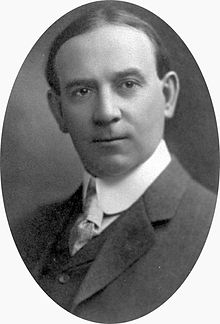Charles Wilson Cross
| Charles Wilson Cross | |
|---|---|
 |
|
| Member of the Canadian House of Commons | |
|
In office October 29, 1925 – September 14, 1926 |
|
| Preceded by | New district |
| Succeeded by | Donald Ferdinand Kellner |
| Constituency | Athabaska |
| Member of the Legislative Assembly of Alberta | |
|
In office March 25, 1913 – May 1925 |
|
| Preceded by | New district |
| Succeeded by | Christopher Pattinson |
| Constituency | Edson |
|
In office November 9, 1905 – June 7, 1917 Serving with John Alexander McDougall (1909–1913) Albert Ewing (1913–1917) |
|
| Preceded by | New district |
| Succeeded by | District abolished |
| Constituency | Edmonton |
| Attorney-General of Alberta | |
|
In office May 4, 1912 – August 23, 1918 |
|
| Preceded by | Charles R. Mitchell |
| Succeeded by | John R. Boyle |
|
In office September 9, 1905 – June 1, 1910 |
|
| Preceded by | New position |
| Succeeded by | Charles R. Mitchell |
| Personal details | |
| Born | November 30, 1872 Madoc, Ontario |
| Died | June 2, 1928 (aged 55) Calgary, Alberta |
| Political party | Alberta Liberal Party, Liberal Party of Canada |
| Spouse(s) | Annie Louisa Lynde |
| Children | One son, two daughters |
| Residence | Edmonton |
| Alma mater | University of Toronto, Osgoode Hall Law School |
| Occupation | Lawyer |
| Religion | Presbyterian |
Charles Wilson Cross (November 30, 1872 – June 2, 1928) was a Canadian politician who served in the Legislative Assembly of Alberta and the Canadian House of Commons. He was also the first Attorney-General of Alberta. Born in Ontario, he studied law at Osgoode Hall Law School before coming west to practice in Edmonton. He became active with the Liberal Party of Canada, and when Alberta was created in 1905 he was chosen by Premier Alexander Cameron Rutherford to be its first Attorney-General. Implicated in the Alberta and Great Waterways Railway scandal, he resigned in 1910 along with the rest of Rutherford's government.
As a backbencher, he became the leader of Liberals opposed to the government of Rutherford's successor, Arthur Sifton, until Sifton re-appointed him Attorney-General in 1912. Cross served in this capacity under Sifton and his successor Charles Stewart until 1918, when Stewart fired him after receiving no response to his request for Cross's resignation. Cross remained in provincial politics until 1925, but in a radically diminished role. After leaving provincial politics, he was elected to the Canadian House of Commons, only to be defeated in his 1926 re-election bid. He died in 1928.
Cross was born in Madoc, Ontario to merchant Thomas Cross and his wife, Marie Mouncey. He studied at Upper Canada College, the University of Toronto, and Osgoode Hall Law School. He moved west to Edmonton in 1897, where he opened a law practice with William Short; it exists today as Duncan Craig LLP. When the idea of creating one or more new provinces out of the Northwest Territories gained currency, Cross was one of three people selected by Edmonton City Council to travel to Ottawa and ensure that Edmonton's interests were respected.
...
Wikipedia
